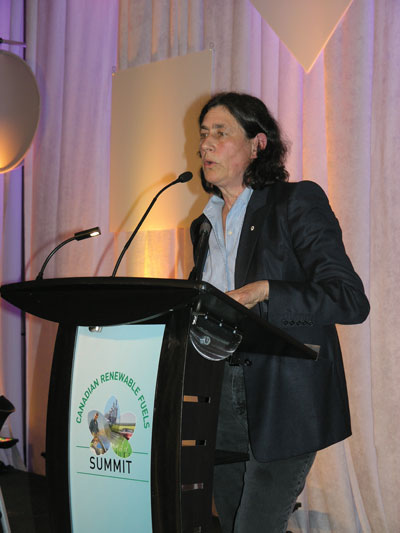
Need for Low-Carbon Fuels at CRFA
February 15, 2013
By
Scott Jamieson
Over 200 delegates gathered in December for the Ninth Annual Renewable Fuels Summit. The past year may have been rough on the sector, but overall a climate of urgency prevailed.
Over 200 delegates gathered in December for the Ninth Annual Renewable Fuels Summit. The past year may have been rough on the sector, but overall a climate of urgency prevailed.
 |
|
| Chantal Hébert opened up the 2012 summit. “I think it’s fair to say that energy issues, including the environment, are the constitutional debate of our time.”
|
Hosted by the Canadian Renewable Fuels Association (CRFA), the event brings together biodiesel and ethanol producers from across Canada, as well as researchers, suppliers, and government officials. Outgoing chair Tim Haig opened the conference by congratulating so many sector leaders for attending after a tough year. Despite uncertain markets, poor growing conditions in the United States, high corn prices, and the re-emergence of the food-versus-fuel debate that many had hoped was over, Haig pointed to the long-term opportunities laid bare by climate change meetings like the Doha Round underway at the same time.
“They show the need for low-carbon transport fuel solutions.”
Political hurdles
They indeed show the need, but the question is who’s paying attention among Canada’s political class? According to keynote speaker Chantal Hébert, very few. As a longtime and award-winning political analyst and reporter with the Toronto Star, Hébert is ideally placed to provide the biofuels sector with a roadmap of the current Canadian federal and provincial political landscape. She cautioned that it’s not an ideal time to accomplish much on the environmental or energy sustainability front.
“I think it’s fair to say that energy issues, including the environment, are the constitutional debate of our time. Yet unlike that issue, there are no larger goals, no clear national objectives, no competing visions. The federal government is not addressing the issue in any meaningful way, so they are leaving it to others to define the debate.”
Add to that the perception that the Harper government is seen as a simple agent of the oil sector, and governments in Ontario and Quebec that lack the clear mandate or fiscal flexibility to pursue ambitious energy reforms, and Hébert sees tough times ahead for interest groups trying to push renewable or alternative energy solutions.
“It will be tough to gain a voice in such a fractured political environment. The renewable fuel sector is not alone on that front, but it’s always wise to invest as much time with the opposition parties as the government, and in the current times that’s even more the case,” she suggested.
That political stalemate is all the more troubling given the message of luncheon keynote speaker Dr. Mark Jaccard of Simon Fraser University. He noted that the goal of limiting global temperature increases to 2°C or less is past; today we are looking more at limiting that increase to 4 or 6°C. Even still, that will require a much more aggressive commitment to reduce fossil fuel use than is currently the case today.
“If groups like this (CRFA) are waiting for high oil prices from scarcity of supply to drive the agenda of renewable fuels, it won’t happen. We need to reach peak emissions long before peak oil. Our problem is that with all the new supply options, there is too much fossil fuel supply, rather than not enough.”
What that means from a policy and lobbying perspective is that the biofuels sector, among others, has to get a lot more aggressive in pushing its agenda, and in selling the need to the public.
Strength in unity
Given that, a unified front would help. There appears to be work to do there as well. The paint was barely dry on the newly announced Bio-Economy Network (BEN) at the summit when cracks started appearing in the alliance.
Just minutes into the launch presentation by Catherine Cobden, executive vice-president of the Forest Products Association of Canada (FPAC), tensions over access to such large-scale funding packages as the NextGen Biofuels Fund came to the forefront of the discussion. The fund is directed to processes that primarily produce biofuels, while the forest products sector may choose to follow processes that either do not have biofuels as a primary product, or do not make biofuels at all.
If the assembled bioeconomy associations had a common song sheet, it was all but lost mid way through question
period. It’s fair to say that this was not the public launch the BEN organizers wanted.
Next year’s summit will be held in Montreal. For more info visit www.greenfuels.org.
Print this page